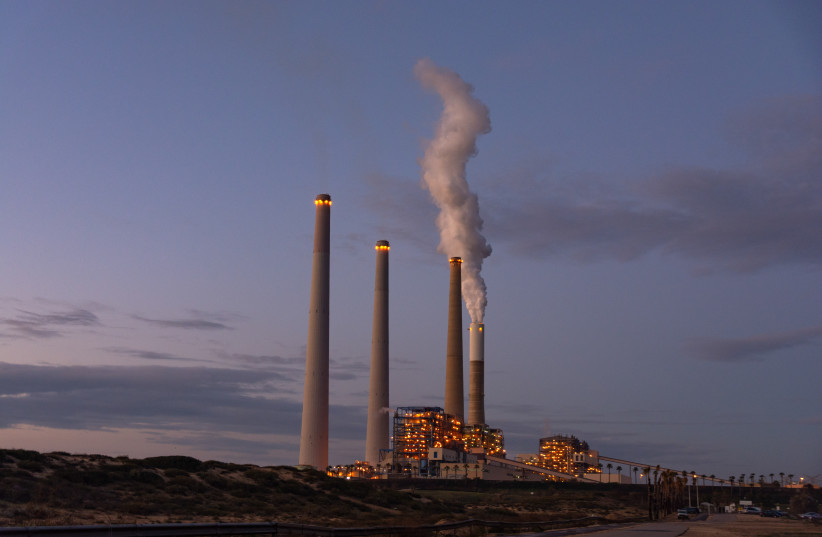Israel will set a goal of zero greenhouse gas emissions by 2050, Prime Minister Naftali Bennett pledged in advance of his departure Sunday for the United Nations Climate Change Conference (COP26) in Glasgow.
“With the new goal,” Bennett said, “Israel is lining up alongside the developed countries that are already taking action to attain the goal of zero emissions, and is redoubling its commitment to the Paris agreement and international agreements on the issue.
“We are responding to the global challenge, finding technological solutions and joining in to achieve this important goal,” he explained.
Bennett announced the zero emissions goals together with Energy Minister Karine Elharrar on Friday. It’s expected that the government could vote on a zero emissions pledge as early as Wednesday.
Many developed countries – the United States, Canada, France, Australia, Germany and Ireland – have already issued such a pledge, Bennett’s office said.

Such pledges are critical to reducing global warming.
Achieving net zero carbon emissions by the middle of this century is a necessary step for a needed 1.5 degree cap on global warming, UN experts have explained.
“The climate crisis affects all of our lives, including that of our children and grandchildren. It affects our lives; therefore, we must be fully determined. Israel is the innovation nation and has the ability to contribute to the world the talents and creativity that only we have,” explained Bennett.
“This is historic,” Environment Minister Tamar Zandberg said. “This is good for the world and it’s good for us.”
Environment Ministry Director-General Galit Cohen explained that in July, the government had approved an 85% greenhouse gas emissions goal by 2050.
On Tuesday, however, the state comptroller published a report saying that much more needed to be done. The report criticized the government for failing to make headway on reducing greenhouse gases emissions and for not setting a goal to completely stop such emissions by 2050.
“This is a challenging step, but it is required in the struggle of the State of Israel against the climate crisis,” Elharrar said on Friday. “I am confident that a massive investment in innovation, changing energy consumption habits and removing barriers to the promotion of renewable energy will succeed in bringing us to attaining net zero greenhouse gas emissions by 2050.”
ON SUNDAY, the government created a climate change task force and approved a program designed to tackle climate change.
Bennett’s office said that moving forward, Israel would need to focus on storage of energy, carbon-trapping, green infrastructures, education, energy conservation and innovation.
Zandberg warned, however, that Israel would have to change its energy strategy to move away from the development of oil and gas fields.
On Sunday Israel will join nearly 200 countries that will gather at the climate change conference, which will take place from October 31-November 12. Bennett is only expected to stay for the first two days.
Talks there will focus on how to strengthen the global plan on climate change set out under the 2015 Paris Agreement.
Six years ago countries agreed to cut greenhouse gas emissions to limit global warming to 2°C degrees Celsius and ideally 1.5°C (2.7°F). To do this, emissions need to be cut in half by 2030 and reach net-zero by around mid-century.
The annual “emissions gap” report by the United Nations’ Environment Programme (UNEP), which measures the gap between anticipated emissions and those consistent with limiting the temperature rise this century, as agreed in the Paris accord, said updated pledges only reduce forecast 2030 emissions by an additional 7.5%, compared to the previous commitments.
If continued throughout this century, this would lead to warming of 2.7°C, slightly less than the 3°C UNEP forecast in its last report. A 30% cut is needed to limit warming to 2°C and a 55% cut is needed to limit warming to 1.5°C.
It said current commitments to net zero could limit warming to around 2.2°C by the end of the century, but 2030 pledges so far do not put major emitters on a clear path to this.
Major emitters China and India, together responsible for around a third of global greenhouse gas emissions, have not yet come forward with strengthened NDCs and need to do so at this conference, known as COP26.
Reuters contributed to this report.
